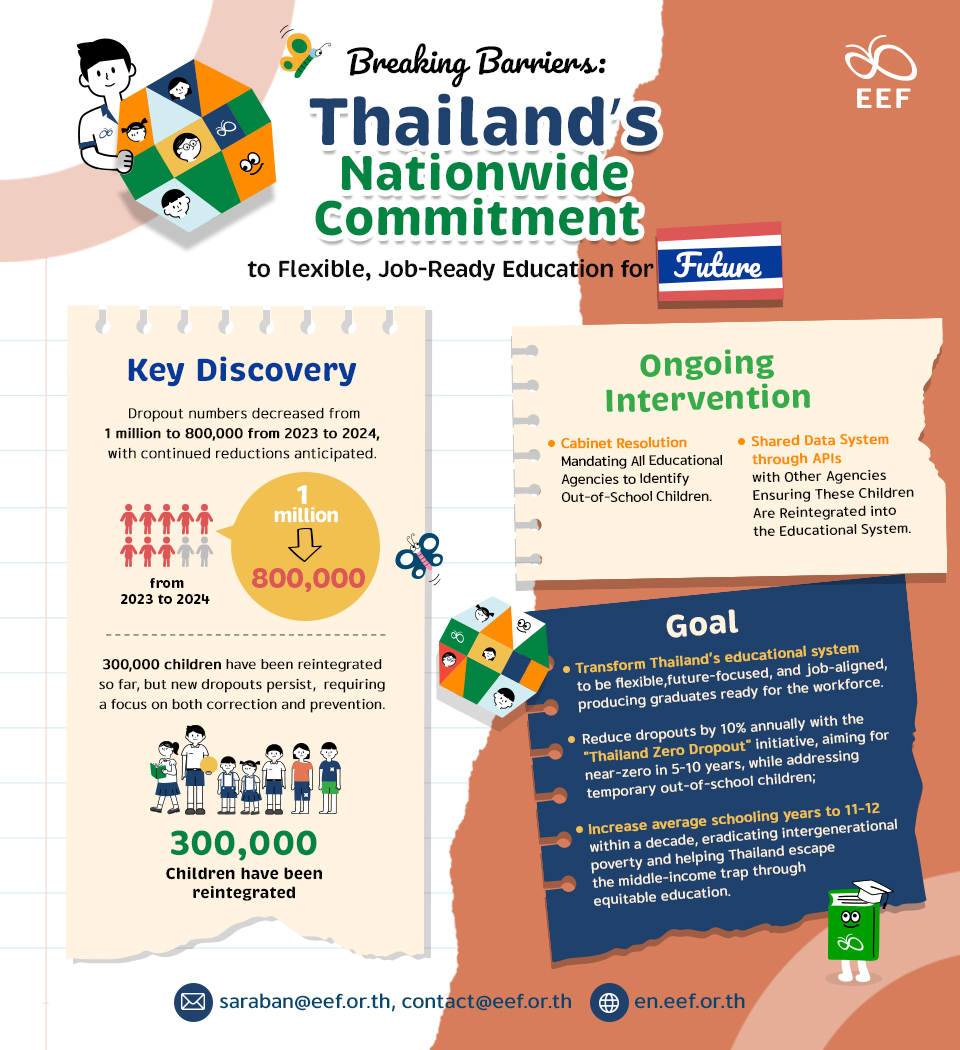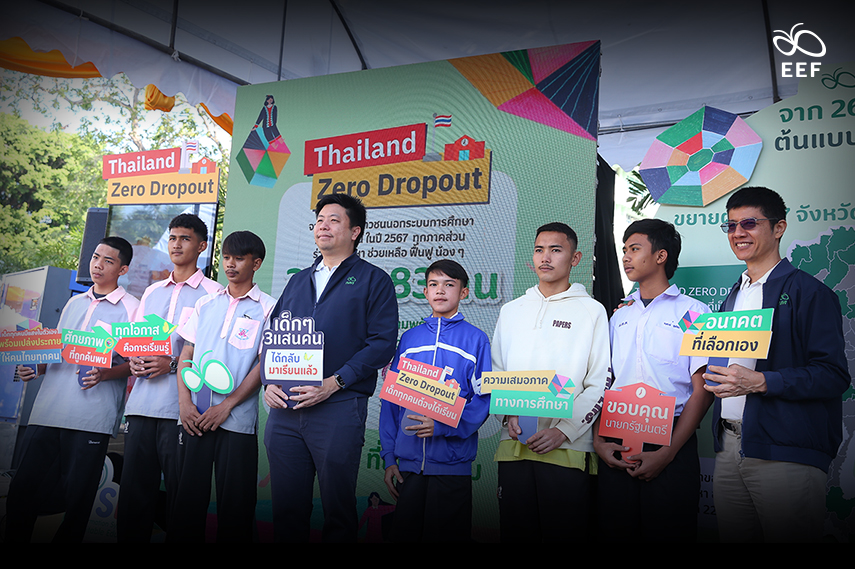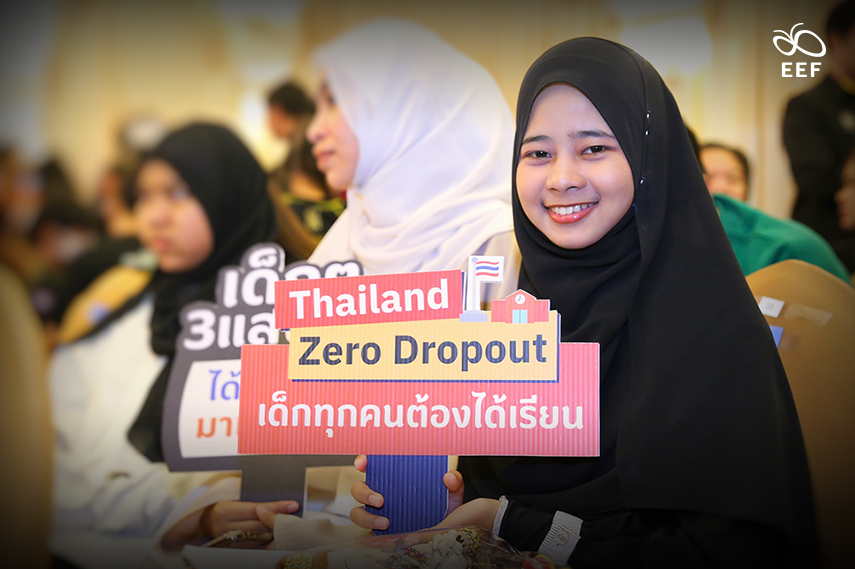
Thailand’s integration of national data systems revealed over a million children who had previously been overlooked by the educational system, shining a light on the vast scale of educational exclusion. This discovery has brought to the forefront the urgent challenges of reintegrating these children and ensuring they stay in school. In the third of this three-part article series, Dr. Kraiyos Patrawart, the Managing Director of the Equitable Education Fund (EEF) Thailand, details the nationwide movement aimed at reducing dropouts, ensuring educational equity, and preparing the workforce for a rapidly changing global economy, with a goal of near-zero dropouts and increased schooling years over the next decade.

Breaking Barriers: Thailand’s Nationwide Commitment to Flexible, Job-Ready Education for Future
Key Discovery
Dropout numbers decreased from 1 million to around 800,000 in 2023,
with continued reductions anticipated.
300,000 children have been reintegrated so far, but new dropouts persist,
requiring a focus on both correction and prevention.
Ongoing Intervention
- Cabinet Resolution Mandating All Educational Agencies to Identify Out-of-School Children;
- Shared Data System through APIs with Other Agencies Ensuring These Children Are Reintegrated into the Educational System.
Goal
- Transform Thailand’s educational system to be flexible, future-focused, and job-aligned, producing graduates ready for the workforce.
- Reduce dropouts by 10% annually with the “Thailand Zero Dropout” initiative, aiming for near-zero in 5-10 years, while addressing temporary out-of-school children.
- Increase average schooling years to 11-12 within a decade, eradicating intergenerational poverty and helping Thailand escape the middle-income trap through equitable education.
Thailand’s concerted efforts to address future school dropouts are focused on reintegrating over a million out-of-school children through flexible learning pathways, government subsidies, and integrated data systems, aiming to create a more inclusive and adaptable educational system that aligns with workforce demands and supports lifelong learning. Building on this momentum, a nationwide movement launched in May 2024, driven by the Cabinet Resolution, has made remarkable progress in tackling the issue of out-of-school children. Through enhanced collaboration and data-sharing, the initiative has successfully reintegrated over 300,000 children into the educational system. However, the rise of new dropouts remains a persistent challenge, highlighting the ongoing need for both corrective actions and proactive strategies to prevent further exclusions.

Dr. Kraiyos Patrawart, the Managing Director of the EEF, pointed out, “Since May 2024, the Cabinet Resolution has set the agenda for all educational agencies to identify out-of-school children. The Ministry of Education and other ministries with educational facilities are all involved in this effort, with the EEF taking the lead in this reform. We’ve shared our data system through APIs with other agencies to bring these children back to school. Last year, the number of out-of-school children was reduced to 900,000, and just last month, it dropped further to 800,000. So far, we’ve successfully reintegrated about 300,000, but new dropouts continue to emerge, so we’re focused on both correction and prevention.”

As part of the government’s overarching “Thailand Zero Dropout“ initiative aimed at addressing educational disparities, he further reiterated the commitment to ongoing reform and inclusive education, stating, “Our goal is straightforward: to reduce this number by 10% each year, and within the next five to ten years, we aim to reach near zero. However, there will always be a small number of temporarily out-of-school children—around 100,000 to 200,000—but no one will be left behind. Everyone is on our radar, and the government is committed to bringing them back into the educational system.”
As Thailand strives for high-income status, addressing educational gaps is crucial for long-term economic prosperity. With an average of just nine years of schooling, the workforce remains under-skilled, limiting growth potential and global competitiveness. In a rapidly evolving economy, the demand for skilled labor is higher than ever, yet many lack the education to meet these needs. Ensuring every child has access to quality education, regardless of background or location, and increasing the average years of schooling will break the cycle of poverty and strengthen the country’s human capital, driving innovation, productivity, and sustainable growth.

“To achieve our goal of becoming a high-income country, we need a skilled labor force. If you compare the number of years of schooling in this region, Singapore stands at 30 years, Malaysia at 11 years, and Thailand lags behind with an average of just nine years. This means that, on average, our workforce remains unskilled or semi-skilled, which is not acceptable for our ambitions. If we can successfully implement the Zero Dropout initiative, we aim to raise the average years of schooling to 11 or 12 in the next few years, if not a decade. This will break the cycle of intergenerational poverty and help Thailand finally escape the middle-income trap through equitable education,” stated Dr. Kraiyos Patrawart as he concluded the insightful interview.
Thailand’s ambitious efforts to address educational disparities are steadily gaining ground, with a strong focus on both reintegration and prevention. In 2023, Thailand made significant strides in addressing out-of-school children through the “Thailand Zero Dropout” initiative, aiming to reduce dropouts by 10% annually with a long-term goal of near-zero dropouts in five to ten years. By integrating a data-sharing system across agencies, the initiative seeks to create a flexible, future-focused education system that produces workforce-ready graduates and increases the average schooling years to 11-12, helping Thailand break free from the middle-income trap.
This three-part series highlights Thailand’s efforts to identify over a million out-of-school children through national data systems and reintegrate them with flexible learning pathways, integrating formal, informal, and lifelong learning approaches. These initiatives aim to reduce dropouts, promote equity, and prepare the workforce for a rapidly evolving global economy. However, meaningful change requires collective action, a mission embodied by the Equitable Education Fund (EEF) Thailand, which works to reduce educational inequality through research, collaboration, and targeted support.
All For Education is all about people; only when all is in for education is Education For All. Join the movement to reduce educational inequality. Support the EEF by donating to fund research, partnerships, and assistance for children, youth, and adults in need of educational support. Click the link to contribute today and help create a society where education is open and equal for all. Together, we can make a lasting impact.

